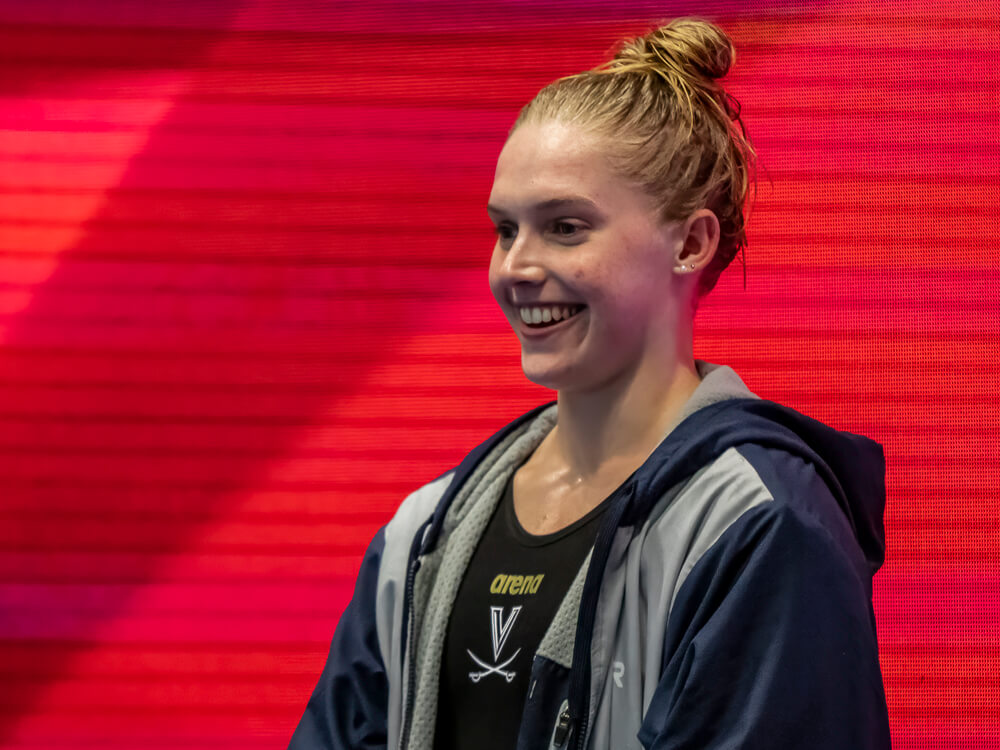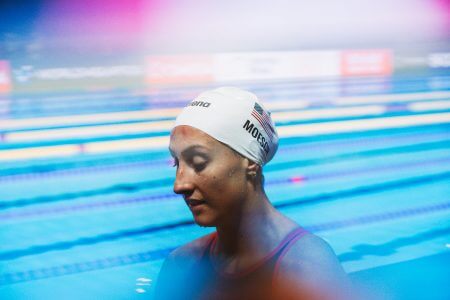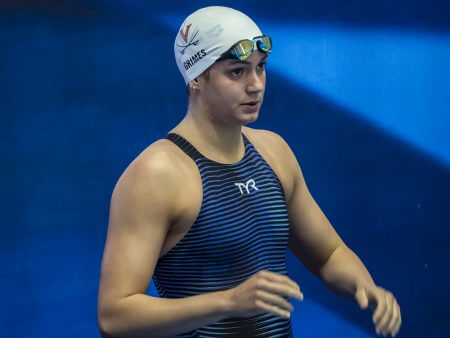Virginia Shows Off Lineup Pursuing Six-Peat, With Claire Curzan and Anna Moesch Starring

Virginia Shows Off Lineup Pursuing Six-Peat, With Claire Curzan and Anna Moesch Starring
At the conclusion of the 2024-25 college swimming season, Virginia graduated two of the most accomplished collegiate swimmers ever. During her four years with the Cavaliers, Gretchen Walsh rewrote the record books in sprint freestyle, butterfly and backstroke. Her older sister Alex Walsh had five years of college swimming thanks to the COVID-19 waiver, and she became the first swimmer ever to win individual NCAA titles in five different events. The Walsh sisters were forces in the Cavaliers’ demolition of NCAA records in all five relays and effectively the co-MVPs of the last two Virginia team championships.
Eight months later, head coach Todd DeSorbo has rebuilt in grand fashion. His team is favored for consecutive national title No. 6, albeit with less breathing room than in previous years. Virginia will not win the national title by 127 points like last year, particularly not with a formidable challenge coming from Torri Huske and the Stanford Cardinal. But Virginia’s midseason results from the CSCAA Dual Meet Challenge showed the scope of talent in this first post-Walsh team.
Out of 13 individual races, a Virginia swimmer holds the top time in the country in five of them. Two of those lead positions belong to Claire Curzan, the NCAA titlist in both backstroke events last season. Curzan has been as quick as 49.12 in the 100 back, only a hundredth slower than she went to win the event last March, and 1:47.89 in the 200 back, just over a second off the NCAA record she set last year.
Curzan also ranks second nationally in the 100 butterfly at 49.68, with only Huske having been quicker, as well as sixth in the 50 freestyle (21.48) and ninth in the 100 free (47.01). This year, she is expected to step into the do-everything ace role that has previously belonged to both Walsh sisters and Kate Douglass.

Anna Moesch — Photo Courtesy: Emily Cameron
The others occupying the top spots after last weekend’s flurry of invitationals are newer names that have never contended for national crowns. Anna Moesch finished fourth (100 free) and fifth (200 free) at last season’s national meet, but now she appears to be one of the country’s top performers in those events. Over the weekend in Knoxville, she became the fifth-fastest performer ever in both events and quickest in the country this season. In the 200, Moesch’s 1:40.25 is ahead of the winning time from last year’s NCAA meet, and her 45.98 in the 200 would have beaten every swimmer other than Gretchen Walsh last season. The sophomore is narrowly ahead of Huske’s best time.
Sophomore Tess Howley is coming off a breakout performance at the World University Games where her 200-meter fly time of 2:05.20 made her the third-fastest swimmer in the world. Now, she is the only swimmer to go under 1:52 in the yards event this season at 1:51.81. She sits ahead of Texas’ Campbell Stoll, Michigan’s Hannah Bellard and Stanford’s Caroline Bricker, the latter of whom is the only returning swimmer to surpass Howley’s fifth-place time last season. Howley is also ascendant in the backstroke events, with her 200-yard time of 1:51.03 ranking seventh in the country.
Moesch and Howley are examples of the next-man-up theory, swimmers who were previously supporting players now stepping into larger roles. Also poised to do so is Aimee Canny, who finished the midseason meet ranked third nationally in the 500 free (4:34.26) and 200 IM (1:54.05), fourth in the 200 breaststroke (2:06.77) and seventh in the 200 free (1:41.85)
IMer Leah Hayes, fresh off two individual golds at the World University Games, is fourth nationally in the 200 IM (1:54.10) and fifth in the 400 IM (4:04.01). Breaststroker Emma Weber and freestyler Cavan Gormsen were additional gold-medal winners from WUGs, and both can expect larger roles this year; the medley relay breaststroke spot that Alex Walsh previously now goes to Weber, whose short course results have not matched up to her long course times thus far.

Katie Grimes — Photo Courtesy: Peter H. Bick
Katie Grimes remains a wildcard, with best times surely good enough for national titles in the 500 and 1650 free plus the 400 IM, but her college results have yet to match up to her times from high school. In a relatively disappointing first NCAAs, Grimes ended up fourth twice and 13th in the 1650. She does sit in a solid spot at the midway point of this season, however, ranking third in the 1650 free (15:52.95) and fourth in the 400 IM (4:03.34). We will get a better sense of her progress at midseason.
Finally, Virginia has three newcomers expected to make a significant impact. Sara Curtis, a freshman sprinter from Italy, owns the nation’s second-best time in the 50 free at 21.18, with only Huske ahead of her, and she is fifth in the 100 free (46.52). Freshman Madi Mintenko is already among the top-eight swimmers in the country in the 200 and 500 free. And former Division II star Bryn Greenwaldt has the raw speed to make an instant relay impact.
Winning relays will become much more challenging for Virginia this year without Gretchen Walsh’s flurry of history-making swims. No longer can the Cavaliers chase records and flex their talent over every other school; the relay strategy puzzle returns, and the results from the CSCAA meet give hints to how DeSorbo and his staff are leaning.
If swimmers could race all five relays at the NCAA Championships, Curzan and Moesch might be on all of them, but each must sit out one event. There was no 800 free relay contested in Knoxville, but Virginia could probably put together a national top-three group with Mintenko replacing Alex Walsh alongside Moesch, Canny and Grimes from last year’s NCAA Championships. That would free up Curzan to contest everything else, just like she did in a series of swift midseason efforts.
Most impressive was Virginia’s 1:31.91 in the 200 medley relay, with Curtis on backstroke, Weber on breaststroke, Curzan handling butterfly in 21.90 (faster than any swimmer in history aside from Gretchen Walsh and Huske) and Greenwaldt anchoring under 21 seconds. The team clocked 1:31.91, only 0.81 off a Walsh-fueled NCAA record from last season and 1.35 seconds clear of the No. 2 team in the country (Michigan). The 400 medley relay is a little more tricky, with Carly Novelline as a butterfly candidate if Curzan leads off and Moesch anchors, but Virginia still has the country’s best mark by more than a second.
In the 200 free relay last weekend, the team of Greenwaldt, Curzan, Curtis and Moesch clocked 1:24.83, the top time in the country by a half-second, while Canny joined Curzan, Curtis and Moesch to go 3:07.70 in the 400 free relay, the second-best time in the country and just 0.11 behind Stanford.
Add up those pieces, and the path to a sixth title comes into focus, even without the same level of star-power. With almost every team having finished their midseason meets, Virginia has a top-four time in the country in 12 out of 13 individual events, and the lone so-called weak event features an Olympian, Weber. That will leave very few chances for Stanford or any other team to pull off a surprise.




Small technical tidbit….while I love her, Alex Walsh wasn’t the first to win NCAA titles in five individual events. She was the second. See Tracy Caulkins.